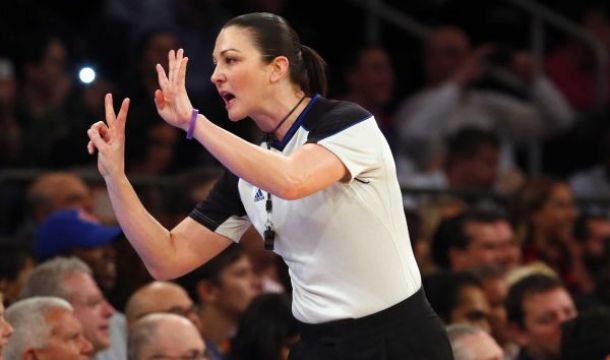Chris Paul, point guard for the L.A. Clippers and one of the Association's best and most respected players, has created a mini media firestorm with his comments about referee Lauren Holtkamp in the aftermath of the Clippers loss to Cleveland last Thursday night.
Specifically, Paul said, in response to a technical foul given him by Holtkamp, that "The tech that I get right there was ridiculous. I don't care what nobody says, I don't care what she says; that's terrible. There's no way that can be a tech. We try to get the ball out fast every time down the court, and when we did that, she said, 'Uh-uh.' I said, 'Why, uh-uh?' And she gave me a tech. That's ridiculous. If that's the case, this might not be for her."
Well, as things tend to do in our current 24/7 media environment where everything even remotely controversial is scrutinized to the extreme degree, Paul's comments have been called sexist by some, troubling by others, and examined by even more. Why? Well, some context is in order. Holtkamp is one of only two female referees in the NBA, and this is her rookie season. There have only been three female referees in NBA history. Perhaps of greater significance is that the NBA was the first, and is still the only, major sports league in North America to employ female officials for an all male competition.
Were Paul's comments sexist, or picking on Holtkamp because of her gender? Well, the only way to know that for sure is to be inside of Paul's heart or, at least, his head given the comments themselves. Certainly, there are times when we can decipher bias or prejudice from comments when it is crystal clear. Even those who are criticizing Paul, or who think his words were sexist, aren't alleging that the words themselves are unconscionable. They are trying to deduce his intent.
This writer doesn't know Paul and can't get inside his head. In point of fact, neither do most who have weighted in on this issue in the social or mainmedia. However, for the sake of argument, let's set aside any perceived bias and look at what we have here. A prominent player who, along with his team, hasn't played well of late speaking in the aftermath of an 11 point loss that wasn't nearly as close as that score might indicate. He, along with his coach and teammates, had been hit with a technical foul, one of five total received by the Clippers that night. After the game, with the sting of that loss still raw, he lashed out an official.
Looking at it with cold, objective dispassion, we have to say that there is nothing historic or unusual there. In fact, we all would probably agree that, if this specific criticism was leveled at any male official, it would barely rate mention on anything above the local news or next day column by the team beat writer. Its became a national story only because Holtkamp is a female.
Lest you think the rest of this article will be a diatribe against so called “political correctness”, you can rest assured that nothing critical of the art of not offending other people or showing bias will ever come from this pen. Instead, assuming that Paul's comments were not intentionally directed at Holtkamp solely because she is a female, the question should be asked: Isn't this the ultimate goal?
When people who are the first (which Holtkamp is not, the NBA has had female referees since 1997), or are part of an easily identifiable minority, it is easy to trumpet their presence or success in a superficial manner. Not saying that is wrong, but it is easy. When they are deserving of criticism for their performance-not to say that Holtkamp is-they should be able to be criticized without referenced to their so called minority status, but also without assumption that their status is the sole reason for the criticism.
Ultimately, what most of us want is a game-and society-that is blind to unfair notions of bias and prejudice. That includes fair criticism, whether its accurate or not. No one likes to be criticized or called out in the media, but it is part of the job description with any position that puts one in the public eye. This is especially true in professional sports. As for criticizing a referee, that is as old as sport itself and as American as apple pie. We can be reasonably sure that Holtkamp has been criticized before in her career and had no expectations of surfing through her NBA journey without being called out, rightly or wrongly.
The guess is that she would like to be treated just like any other official and judged solely on the merits of her abilities and performance. Obviously, she is very good at what she does or she wouldn't be calling games in the NBA. We're not where so many of us want to be, yet, but maybe if Paul called out Holtkamp in the same manner he would have a male referee in the same circumstances, we're not as far away as some would have us believe.










































